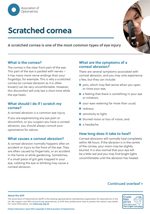Scratched cornea
A scratched cornea is one of the most common types of eye injury
What is the cornea?
The cornea is the clear front part of the eye. This part of the eye is packed with nerves – it has many more nerve endings than your fingertips, for example. This is why a scratched cornea (or corneal abrasion as it is often known) can be very uncomfortable. However, this discomfort will only last a short time while the eye heals.
What should I do if I scratch my cornea?
A corneal abrasion is a common eye injury.
If you are experiencing any eye pain or discomfort, or you suspect you have a corneal abrasion, you should always consult your optometrist for advice.
What causes a corneal abrasion?
A corneal abrasion normally happens after an accident or injury to the front of the eye. They are often caused by fingernails, or an accident in the home or while gardening. Sometimes, if a small piece of grit gets trapped in your eye, rubbing the eye or blinking may cause a corneal abrasion.
What are the symptoms of a corneal abrasion?
There are several symptoms associated with corneal abrasion, and you may only experience a few, but they can include:
- Pain, which may feel worse when you open or close your eye
- A feeling that there is something in your eye or irritation
- Your eyes watering far more than usual
- Redness
- Sensitivity to light
- Blurred vision or loss of vision
- A headache
How long does it take to heal?
Corneal abrasions will normally heal completely within 48 hours. If the abrasion is in the centre of the cornea, your vision may be slightly blurred. It is also normal that your eye will be a little red and you may find bright lights uncomfortable until the abrasion has healed.
Treatment
You may be given lubricating drops (artificial tear drops, gel or ointment) to make your eye feel more comfortable and help to keep it moist.
You may be given antibiotic drops or ointment to stop the abrasion becoming infected. These aren’t always needed, but your optometrist will be able to tell you if you need them.
The following may also help:
- Over-the-counter painkillers such as paracetamol will help with the pain
- Avoid rubbing or touching your eye as this may make the abrasion worse or slow down the rate of healing
- Wearing sunglasses may help if you are sensitive to light
- If you wear contact lenses, you should not wear them until the corneal abrasion has completely healed. Your optometrist or contact-lens practitioner will be able to tell you when you can wear your lenses again
If your vision starts to become more blurred, or if the pain and redness increase, you should get advice from your optometrist. If they are not available, go to A&E.
Resources for your practice
 If you're a practitioner, we recommend that you use this information, following a suitable examination, to reinforce advice given to the patient who has a corneal abrasion.
If you're a practitioner, we recommend that you use this information, following a suitable examination, to reinforce advice given to the patient who has a corneal abrasion.
For more information on eye health, go to our For patients section.

